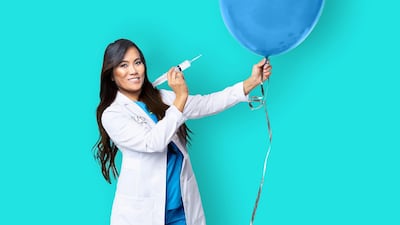If you told a young Sandra Lee that she’d be a famous dermatologist one day, she may not have found the idea so far-fetched. Her father was a beloved dermatologist himself, and she grew up reading about skin ailments.
But famous for popping pimples online?
Dermatology diva
"It's really fascinating to me that people are so interested in this," she tells The National. With 4.1 million Instagram followers, 6.9 million YouTube subscribers and three TV series and counting, Dr Lee has hit the sweet spot when it comes addictive digital pastimes.
While her medical career may have been a lifetime in the making, her internet fame kick-started six years ago – almost overnight. “I started an Instagram page just as a little window into my world,” she says. “When everybody else was looking at travel and food pics, there were no doctors on Instagram, and I thought dermatology would work well visually.”
Although her first post was just, as she puts it, a simple blackhead extraction, “it kept getting an increase in attention”. Lee didn’t know it at the time, but she had stumbled upon something boiling beneath the social media surface.
“I quickly realised that there were people on the internet sharing pimple-popping videos with each other.” Once again, the World Wide Web proved itself a place that ensnares people with hobbies and fascinations of all and any flavour – but the pus-obsessed party were missing one key element: a figurehead.
Seeing her views quickly ascend, Lee thought: “This is weird and interesting, but also, I could be their queen.”
Benign masochism
While discussing the rush of joy when a closed comedone finally breaks free doesn’t make for dinner talk, a fixation over exploding epidermoid cystsands and misleading milia isn’t all that unusual. In fact, some scientists put it down to a phenomenon coined benign masochism: humanity’s draw to things unappealing, scary or even disgusting.
This can be likened to our desire to riding a stomach-dropping rollercoaster or watching a gruesome movie. Even though the build-up might not be nice, we feel a sense of satisfaction watching a pus parcel make contact with the bathroom mirror. All Lee did was make it socially acceptable to admit it.
Now on the third season of her TV show Dr Pimple Popper – which first aired in January 2018, and features the dermatologist in her California practice treating patients with facial and skin concerns – does the good doctor still get satisfaction from a successful squeeze?
"Giant blackheads are the seven wonders of pimple popping – they're really something to marvel at," she tells The National. "I personally prefer working on those as they come out very clean – they're amazing in themselves."
With no incision or knife needed for this kind of clean up, it’s palatable even for squeamish viewers. But is there anything that still grosses out the professionals? “If something happens, like maybe something sprays out or gets on you or there's an odour or something … we know not to express any disgust because that's very important for our patients. You don't want them to be embarrassed or feel bad or ashamed. And so, part of that works in your way too, so that you aren't disgusted.”
Helping hand
Despite the compelling nature of her videos, there is, of course, a more serious side to Lee’s work. “It’s not just about entertainment, but also education. I'm really proud of the fact that 5 and 7-year-olds know what a lipoma is.” And – as anyone who has watched the show can tell – it has a heartfelt element, too.
Lee stresses that her TV series portrays real people with real concerns, and her goal is to help them. “I took over my dad’s practice, and therefore his patients that loved him – so I had to make sure they loved me, too.”
Unlike many other medical specialities, her patients are usually awake while she operates on them, quite literally, face-to-face. Talking with them, calming, reassuring and comforting is a big part of her job role, and this makes it all the more rewarding. “I think about how awesome it is that I get to see how it changes their lives.”


